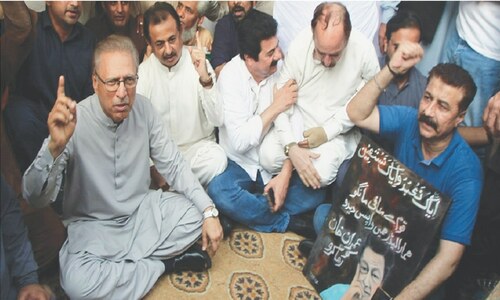ISLAMABAD: Lawmakers, including a number of ministers, on Wednesday voiced concern over the resurgence of the outlawed Tehreek-i-Taliban Pakistan (TTP) in Swat and the rise in incidents of militancy and sectarianism in various parts of the country, as the head of his own faction of Balochistan National Party (BNP-M) Sardar Akhtar Mengal protested the killing of youths in alleged fake encounters in home province.
Speaking on points of order in the National Assembly, members dubbed the law and order situation in the country “very serious” and stressed the need for collective measures by all state institutions “before it is too late”.
The ministers also called for constituting a truth and reconciliation commission, especially for Balochistan, as part of efforts to mitigate the 75-year suffering of the people of the province.
Besides expressing apprehensions over the ongoing military operations against the terrorists, the ministers also lashed out at the country’s judiciary for what they called not providing justice to people.
Members seek truth and reconciliation commission for Balochistan; Mengal accuses security forces of killing youth in ‘fake encounters’
Minister for Climate Change and PPP Senator Sherry Rehman demanded that parliament should be briefed on the ongoing operations against terrorism, suggesting that a joint session of parliament could also be convened. “Operations [against militants] are being carried out. In which direction these [operations] are heading? We should be told as this is a matter of concern,” she said.
“There can be no engagements with terrorists. If you want to talk to them, then it can only happen after they [terrorists] first lay their weapons as a pre-condition,” she said in an apparent reference to reports about the ongoing talks with the TTP by the country’s security establishment.
“It is not understandable as to how can there be a compromise with the terrorists?” she asked, while highlighting the sacrifices her party had offered in the war against terrorism. The PPP, she said, had always been a soft target of the terrorists and the party had lost its hundreds of workers, besides former prime minister Benazir Bhutto, who was assassinated at Rawalpindi’s Liaquat Bagh in December 2007 hours after she vowed to get the people of Swat rid of the TTP.
“It is only a fight for power, not for religion. We eliminated Al Qaeda from here, and now the TTP is trying to rise again, and in what capacity?” she asked.
Defence Minister Khawaja Asif also expressed concern over the rise of Taliban in Swat and warned that this wave of terrorism could also spread to other areas. He said responsibility rested with all the institutions to find a solution to the threats faced by the state. He appreciated the people of Swat for coming out in the streets against the terrorists.
Mr Asif said the political leadership should take the initiative to find a permanent solution to the problems faced by the people of Balochistan.
A “low-intensity insurrection” had been going on in Balochistan for many decades, said the minister while stressing the need for initiating dialogue with the Baloch leaders. The issue, he said, could not be “wished away” and the house, too, needed to show some seriousness on the matter.
Human Rights Minister Riaz Pirzada said he would say it openly that “our judiciary and armed forces have failed to provide protection to the people”.
“Today, we are summoned [by courts] to tell us that jails are overcrowded. If it is so then decide the cases. You [the courts] neither take decisions nor provide us protection,” said the minister, alleging that state institutions were involved in land-grabbing in Punjab. He said the “retired people” were occupying lands in the Cholistan area of Bahawalpur.
Presenting a grim human rights situation in the country, the minister said the people belonging to the Ahmadi community were being murdered, their places of worship were being damaged and Shia scholars were facing target killings. Despite all this, he said, they were holding talks with the Taliban.
‘Fake encounters’
Earlier, BNP-M chief Akhtar Mengal alleged that the security forces were killing the youth in fake encounters in Balochistan. Providing details of the recent incidents in Mastung, Ziarat and Kharan, he alleged that the security forces had killed those Baloch youth who had gone missing from various parts of the province many years ago.
“Most of the youth in Balochistan have already reached to a point of no return,” he said. “Literally genocide is taking place in Balochistan like it happened in Bangladesh [former East Pakistan] in 1970,” he said, quoting the Hamoodur Rehman Commission report.
Mr Mengal said previously they were told that these missing persons had gone to Afghanistan. If they were living in Afghanistan, he said, then how their bodies were being found in Pakistan. He also criticised the country’s Afghan policy, saying it was all happening when they were celebrating Taliban takeover and claiming that Afghanistan had become Pakistan’s fifth province.
He called for constituting a high-level judicial inquiry commission, headed by a sitting Supreme Court judge, to probe the “fake encounters” in Balochistan.
Mr Mengal also called for carrying out the DNA tests of the dead bodies found from the rooftop of a Multan hospital, fearing that these corpses could be of the missing persons from his province.
Published in Dawn, October 20th, 2022













































